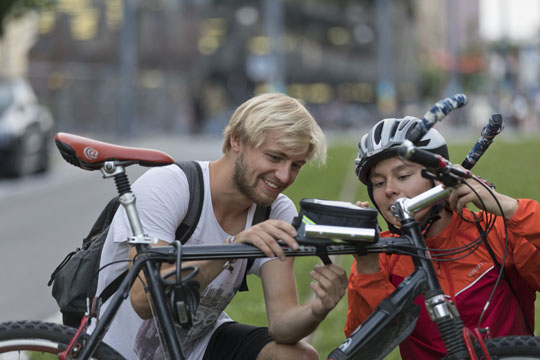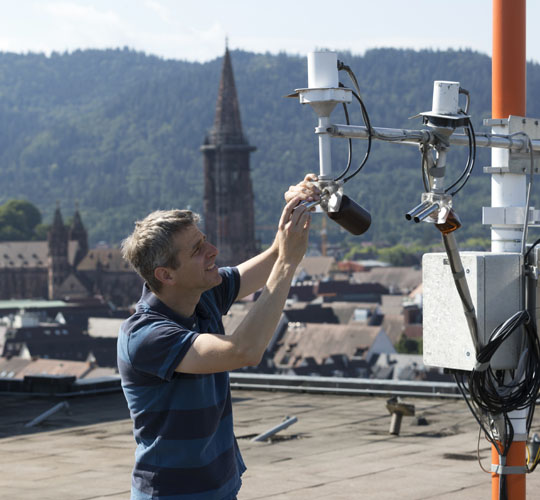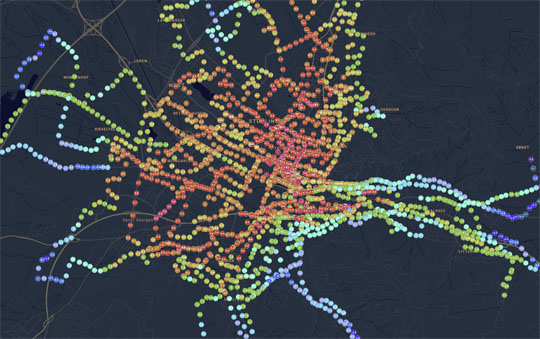Measurements with the Meteobike
Freiburg, Aug 22, 2018
Together with his students, Freiburg meteorologist Prof. Dr. Andreas Christen has developed a mobile smartphone-connected weather station made with a microcomputer, SD card, GPS receiver, temperature sensor, power bank, bicycle bag, a piece of pipe and rubber. The students can attach it to their bikes, ride around sophisticated routes throughout Freiburg and collect and transmit real-time meteorological data. The device costs just under 60 euros, and Christen’s idea may just spread worldwide.
 Ready for take-off in the city: The mobile weather station costs around 60 euros and delivers reliable data.
Ready for take-off in the city: The mobile weather station costs around 60 euros and delivers reliable data.
Photo: Jürgen Gocke
If every revolution can begin with a new mixture as the convenience food industry claims, then Freiburg’s environmental meteorology can determine its flavor. It is raspberry – that is, Raspberry Pi Zero W to be exact. It isn’t the name of a new artificial aroma, but rather the term for a microcomputer capable of wireless communication. It is revolutionizing current standards and has brought a new kind of mixture to student life. And that is where the parallels with the advertising slogan end because it has nothing to do with nutritional science, but rather with meteorological data gathering. And the Raspberry has the right stuff to become the hero of data gathering. But reaching far back as the famous egg of Columbus, it is not only about the technology applied, but also about the innovative idea behind it. Andreas Christen, Professor for Environmental Meteorology at the University of Freiburg, had just that.
Customarily, weather data are measured worldwide at airports in particular. After all, air traffic needs the most accurate data possible for routing. But for meteorologists, the fact is important that roughly the same conditions prevail at airports and outdoor areas everywhere: a wide, flat landscape, short mowed grass and no flow restrictions. This makes climate data easier to compare worldwide.
 Andreas Christen monitors the new weather station located on the roof of the chemistry tower.
Andreas Christen monitors the new weather station located on the roof of the chemistry tower.
Photo: Jürgen Gocke
“On the other hand more than 50 percent of the world’s population live in urban areas,” says Christen. “They would prefer to know what is happening weather-wise in their own area rather than what the climate is like on the runway.” The climate within Freiburg differs entirely from the conditions at the airfield. Since 1999, the University has therefore operated a weather station on the chemistry tower on the natural sciences campus, which has now been replaced by a new station with advanced features and will get a new Website soon as well. Every day, more than a thousand people visit the Website, and compared to the data collected at the airport, it is easy to see the effect of cities forming so-called heat islands where the temperature can be up to five degrees warmer than in the surrounding area.
 Freiburg at a glance: The blue dots signify where the students measured lower temperatures while the red ones illustrate locations in which the urban heat island effect is particularly pronounced.
Freiburg at a glance: The blue dots signify where the students measured lower temperatures while the red ones illustrate locations in which the urban heat island effect is particularly pronounced.
Source: Andreas Christen
The cooling effect of nocturnal wind from the mountains
But even within the city, the climate is not the same everywhere. That is where the digital raspberry and Christen’s captivating new idea come in. The researcher combined the capabilities of the Raspberry Pi Zero W and the location-flexible data collection to form a mobile weather station in the shape of a Meteobike. Here is how it works: Christen’s students developed a mobile smartphone-connected weather station made with a microcomputer, SD card, GPS receiver, temperature sensor, power bank, bicycle bag, a piece of pipe and rubber. The students can attach it to their bike wheels, ride around sophisticated routes throughout Freiburg and collect and transmit real-time meteorological data, which make the temperature differences between Münsterplatz, Sonnhalde and Schwarzwaldstraße immediately apparent.
When 25 students cycle through the city for one-and-a-half hours with their Meteobikes, the data collected reveals a very differentiated picture of the urban climate - which, by the way, refutes the claim recently made by celebrity meteorologist Jörg Kachelmann that the wind coming off the mountains somehow had a nocturnal heating effect: “In the Dreisam Valley, which is influenced by the mountain wind, the students measured a temperature at night that was three degrees lower than in the rest of the city,” thereby confirming for Christen the subjective feelings that the Freiburg population has had about the perceived cooling effect of the mountain wind.
Cost-effective and easy to replicate
“Especially in terms of teaching, the Meteobike is an unusual and exciting method of making the climate really tangible, such as how students feel about the weather on the bike, which can be compared directly via their smartphones,” says the researcher. “At the same time, it teaches them to work out how to meaningfully visualize these data, for example.”
There is another argument for mobile data collection: a complete Meteobike set including its bag costs 60 euros compared to a high-end weather station such as the one in the chemistry building that costs 10,000 euros.
“Of course, the low price will give it a qualitative edge, but it will also have to teach students to calibrate deviations and cope with measurement errors,” affirms Christen, emphasizing its pedagogical value. In addition, Meteobiking can also make a name for itself in research around the world. Particularly large cities in less well-off countries have the opportunity to contribute cost-effectively to previously missing data that are important for urban climate research, such as in tropical regions. That, too, is one reason why Christen is providing both the construction plan for the mobile weather station and the collected data as an open source, available for free on the net.
Jürgen Reuß
University of Freiburg weather station
Replicating the mobile measurement station

